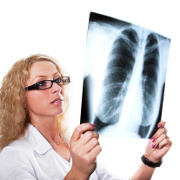 Photo: Getty Images
Photo: Getty Images
The human papillomavirus (HPV), a common sexually transmitted virus, which accounts for 70 percent of all cervical cancers, may also be linked to lung cancer, researchers found.
People with lung cancer are significantly more likely to have several forms of high-risk human papillomaviruses (HPV) antibodies compared to those without lung cancer according to researchers with the International Agency for Research on Cancer (IARC)
While a number of previous studies have demonstrated the presence of HPV in lung cancer, researchers are still unsure what, if any, role the viruses play in the development of lung cancer.
"We know that HPV can reach the lung as in respiratory papillomatosis, but whether HPV can cause frank malignancies is a question we hope to answer," said Devasena Anantharaman, Ph.D., postdoctoral fellow in the Genetic Epidemiology Group at the IARC in Lyon, France. She reported the study's findings at the AACR 102nd Annual Meeting 2011 in Orlando, Fla.
HPVs are a group of more than 150 related viruses can cause common warts, which are benign (non-cancerous) tumors. More than 40 types of HPV are more sinister. These can be sexually transmitted, causing genital warts and certain types of cancers, according to the National Cancer Institute (NCI), part of the National Institutes of Health.
In the general population HPV is quite common, particularly among young adults 20 to 25 years of age," said Anantharaman.
High-risk HPVs are the primary cause of cervical cancer, throat cancer, anal cancer, as well as in other areas of the reproductive system in men and women — vulva, vagina and penis. About 15 high-risk HPV types have been identified, including types 16 and 18, which together cause about 70 percent of cervical cancers.
It is important to note, that the great majority of infections with high-risk HPV types go away on their own and do not cause cancer, according to the NCI.
For the study, the researchers looked for several high-risk and low-risk types of HPV in 1,633 lung cancer patients and 2,729 patients without lung cancer.
Researchers found those without lung cancer had fewer types of HPV compared to those with lung cancer who were significantly increased for eight types of high-risk HPV. The researchers ruled out smoking, the strongest risk factor for lung cancer, for this effect. The results were consistent in current smokers, former smokers and nonsmokers.
Gardasil, a HPV vaccine to prevent cervical cancer, is available through health care providers, however right now it’s not clear the same vaccine could also be used to prevent lung cancer.
The National Cancer Institute has more information about HPV and cancer: http://www.cancer.gov/cancertopics/factsheet/Risk/HPV
Lynette Summerill is an award-winning writer who lives in Scottsdale, Arizona. In addition to writing about cancer-related issues for EmpowHER, she pens Nonsmoking Nation, a blog following global tobacco news and events.






Add a Comment1 Comments
I wish I had known this sooner, how HPV can easily be acquired through sexual contact. I mean, I had little knowledge of this before and dismissed the fact that I was going to be susceptible until it was too late. I got genital warts when I was in my early 20s. I'm 27 now. I was depressed for a while because I thought my dating life was over. I tried solving my warts problem by looking for something to get rid off my warts. What worked for me was this miracle potion in a bottle Wartscide. I think it was pretty amazing how my warts fell off after two days. They blackened (I know, gross!) but when they fell of I felt a huge sigh of relief. It worked for me. So now I'm wartless and I use protection.
July 10, 2011 - 4:19pmThis Comment